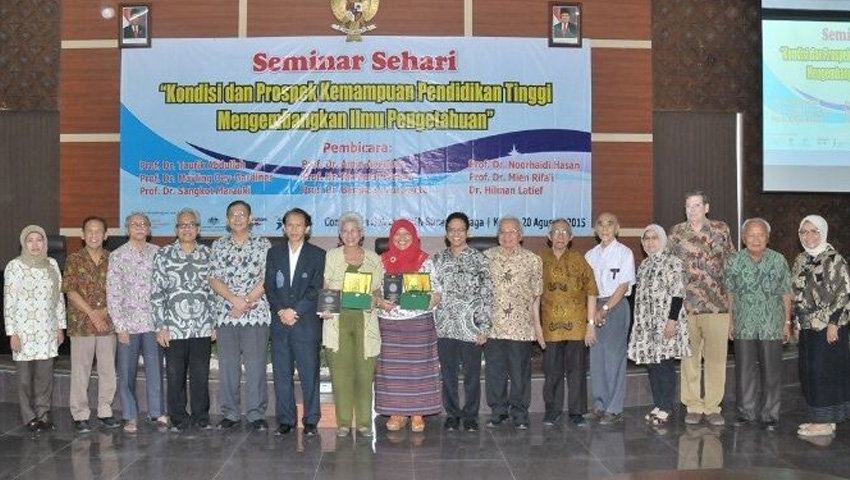A one day seminar in cooperation with Universitas Islam Negeri (UIN) Sunan Kalijaga and Akademi Ilmu Pengetahuan Indonesia (AIPI) with KSI supports on Thursday, August 20, 2015, runs very festive. The seminar titled "Condition and Prospects of Higher Education Ability on Developing Science" was attended by more than 150 participants. In addition to the number of participants, the enthusiasm in asking critical questions also became evident that many academicians’ beings care about the future of higher education in Indonesia.
The seminar was divided into 3 sessions, 8 speakers deliver topics related to how to develop better higher education in the future. The speakers are Prof. Dr. Mayling Oey-Gardiner of (AIPI-Social Science Comission), Prof. Amin Abdullah (the head of culture commission AIPI), Rector of the University of Sanata Dharma, John Eka Priyatma, M.Sc., Ph.D., Prof. Dr. Bambang Purwanto (UGM) and Prof. Dr. Noorhaidi Hasan (Director of Post Graduate UIN Sunan Kalidjaga), Prof. Dr. Mien A. Rifai (AIPI) and Dr. Hilman Latif (Director LP2M UMY).
Prof. Dr. Taufik Abdullah, chairman of the Social Science Commission AIPI in the opening remark flicked, "We are busy with linearity, linearity and linearity”. The linearity perspective on higher education make as rigid view for knowledge development.
In the first session, Prof. Dr. Mayling Oey-Gardiner explained the importance of research in university as a benchmark and a stimulus for the advancement of the nation. She highlighted related setback of higher educations in our country are generally caused by the complexity of administrative things. Second speaker, Prof Amin Abdullah mentioned that research has not so grown in Indonesia because one reason is researchers and lecturers too comfortable in teaching. "The point is limited transfer of knowledge, not the creation of knowledge and skills," said Amin. If researchers and lecturers have new scientific mentality, the spirit of interdisciplinary/multidisciplinary/transdisciplinary scientific approach, it will be able to see and to analyze in a new way that creates something new. Drs. John Eka Priyatma, M.Sc., Ph.D. Rector of the University of Sanata Dharma Yogyakarta discussed the philosophical side of higher education, education is a matter of how to produce output that would have dedicated to the environment and the welfare.
Prof. Dr. Bambang Purwanto in the second session acknowledged on how the concept of research in higher education is still too exclusive and limited to those who have access only. Prof. Noorhaidi added the lack of relationship between lecturers and students in the research cooperation, and limited research collaboration/network with other institutions. What will happen is stagnation, "So the question, are Indonesian lecturers ready to compete with the quality of neighboring country lecturers?"
A student named Al-Munawwar bin Rusli rom North Sulawesi has a critical to question the future of higher education in Indonesia in terms of the relation "ABG" (Academic, Business, and Government). Prof Nurhaidi said higher education in Indonesia still has hope to be equal with other universities in developed countries. As Prof. Noorhaidi emphasised on the importance to maintain the academic culture in university. The bureaucracy government should not be an obstacle for academics campus to grow and progress.
In the last session, Prof. Mien A. Rifai said, complaints of various academic publications including the accreditation with low quality published, in the midst of abundance thesis, master's thesis and doctoral dissertation. Hilman Latif, Ph.D., delivered UMY experiences to encourage the writing of the article for lecturers in UMY with incentive schemes.
The last speaker, Prof. Dr. Sangkot Marzuki mentioned that behind the research, either independently or under the university, should be given the possible autonomy widely, particularly in the management of financial and the policy direction. Given authority to the research institution/university managers make they work on behalf of the advancement of knowledge and without pressure, not because of political interests or other interests. In closing the discussion, moderator Ahmad Zainal Arifin closed with an interesting statement, "Today is not a seminar event, but a momentum for the advancement of higher education in Indonesia.”






